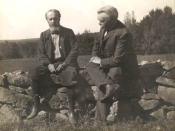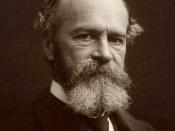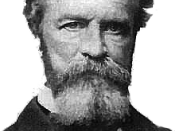"Morals" is a word that is thrown around carelessly these days. According to adults, a girl that wears a short skirt has no morals, and according to most teenagers they are morally wronged if they are not allowed to go out on a school night. Today morals have turned into an adjective that can be used in any sentence at any time. The Merriam-Webster Dictionary defines morals as "conforming to a standard of right behavior." William James has his own theory on morality. He believes that people decide whether or not to have morals by their own free will.
Book IX of "The Will to Believe" talks about questioning morals. Questions of morality are situations, which present themselves as being unable to wait for scientific proof. "A moral question is a question not of what sensibly exists, but of what is good, or would be good if it did exist (Burger)."
Science can tell people what exists, but it can't approach the question of one's self worth. Since people can not consult science, they should turn to what the French philosopher, Pascal, calls a heart. Science confers with the heart when it is trying to prove the absolute exposure of fact.
William James notes that the question of having moral beliefs or not is decided by a person's own free will. If a person's heart does not want a world full of morals, then the brain will make certain that the person will never believe in a moral reality. The skeptics, however, will agree with the natural instinct instead of strict worshipping. Some people are so closed off from the world that morals mean nothing to them and they will continue acting better then the people who do believe in morals but are afraid to speak because they don't want...


